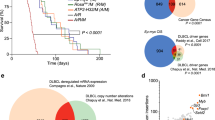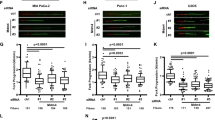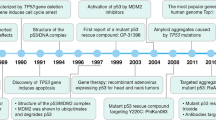Abstract
Numerous studies have indicated that inactivation of p53 is one of the essential requirements for the unrestrained growth of tumoral cells. When the status of the p53 gene was examined in various types of lymphoid malignancies, mutations in p53 have been predominantly detected in Burkitt's lymphoma (BL) cells, therefore suggesting that alteration of p53 could specifically contribute to the malignant phenotype of these tumoral cells. In addition to mutations, functional inactivation of p53 can also occur through interaction of the wild-type gene product with various viral or cellular proteins. The cellular MDM2 protein, for example, is able to inhibit p53 tumor suppressor function by concealing its transactivation domain. Mdm2 gene amplification has been described in several types of sarcomas, resulting in overexpression of the MDM2 protein. In this study, we have examined the status of MDM2 and p53 in 20 BL cell lines. Four were found to contain wild-type p53 and to overexpress MDM2 protein. Within these BL cells, both molecules are physically associated since they can be co-precipitated and p53 is inactivated as cells neither arrest in G1 nor enter apoptosis following γ-radiation. We also report that the high level of the MDM2 protein in BL cells is neither associated with an amplification of the mdm2 gene nor with an elevated level of RNA or an increased protein stability, but is rather due to an enhanced translation ability of the mdm2 RNA. These results indicate that in certain BL cells, overexpression of MDM2 protein regulated at the posttranscriptional level, induces an escape from p53-controlled cell growth.
This is a preview of subscription content, access via your institution
Access options
Subscribe to this journal
Receive 50 print issues and online access
$259.00 per year
only $5.18 per issue
Buy this article
- Purchase on Springer Link
- Instant access to full article PDF
Prices may be subject to local taxes which are calculated during checkout
Similar content being viewed by others
Author information
Authors and Affiliations
Rights and permissions
About this article
Cite this article
Capoulade, C., Paillerets, Bd., Lefrère, I. et al. Overexpression of MDM2, due to enhanced translation, results in inactivation of wild-type p53 in Burkitt's lymphoma cells. Oncogene 16, 1603–1610 (1998). https://doi.org/10.1038/sj.onc.1201702
Received:
Revised:
Accepted:
Published:
Issue Date:
DOI: https://doi.org/10.1038/sj.onc.1201702
Keywords
This article is cited by
-
Targeting cell membrane HDM2: A novel therapeutic approach for acute myeloid leukemia
Leukemia (2020)
-
Modulation of Protein–Protein Interactions for the Development of Novel Therapeutics
Molecular Therapy (2016)
-
Mir-660 is downregulated in lung cancer patients and its replacement inhibits lung tumorigenesis by targeting MDM2-p53 interaction
Cell Death & Disease (2014)
-
JAK2V617F negatively regulates p53 stabilization by enhancing MDM2 via La expression in myeloproliferative neoplasms
Oncogene (2012)



